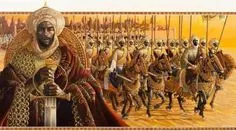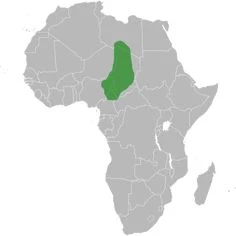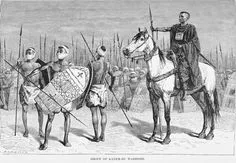FOREIGN POLICY under GHANA
The West African Ghana Empire, also known as the Wagadou Empire, was a powerful political and economic entity that existed from approximately the 4th to the 13th century. While limited historical documentation makes it challenging to provide an extensive analysis, we can delineate some aspects of the empire's diplomatic and foreign policies based on available knowledge.
The Ghana Empire, located in the region encompassing modern-day southern Mauritania and Mali, held a strategic position that facilitated trade and cultural exchanges between the Arab world, North Africa, and sub-Saharan Africa. Diplomacy and foreign relations played a vital role in maintaining the empire's dominance and expanding its influence in the region.
At the heart of Ghana's diplomatic policy was its control over the trans-Saharan trade routes. The empire commanded the exchange of gold, ivory, salt, and various goods from the south, while facilitating the introduction of North African and Arab products in the region. Ghana's rulers recognized the importance of trade and actively engaged in diplomatic efforts to foster commercial relationships.
To manage diplomatic affairs, the Ghanaian rulers appointed ambassadors and envoys to interact with neighboring states and distant powers. These emissaries were responsible for negotiating trade agreements, securing alliances, and resolving disputes. The presence of Ghanaian ambassadors in foreign courts helped solidify the empire's political legitimacy and expand its network of relationships.
The empire's diplomatic engagements were not limited to commercial affairs but also included cultural and religious interactions. Ghana's rulers embraced Islam, which significantly influenced the empire's foreign policy. By adopting Islam, Ghana sought to establish connections with powerful Muslim entities, such as the Almoravid dynasty in North Africa. This religious alignment enabled the empire to forge diplomatic ties based on shared religious values and facilitated cultural exchanges.
Ghana's vassal states, known as tributary kingdoms, played a crucial role in its foreign policy. These states acknowledged the supremacy of the Ghana Empire and paid tribute in exchange for protection. The Ghanaian rulers maintained alliances with vassal states by providing military assistance, ensuring stability within their territories, and integrating them into the empire's administrative structure. This hierarchical system allowed Ghana to expand its influence without direct military conquest.
Moreover, the Ghana Empire's diplomatic and foreign policies extended beyond its immediate surroundings. The empire engaged in diplomatic relations with the Islamic Caliphates of North Africa, such as the Abbasid Caliphate and later the Almoravid dynasty. These interactions resulted in the establishment of trade routes, cultural exchanges, and the integration of Islamic practices within Ghanaian society.
Ghana's rulers also used diplomatic marriages as a means of strengthening alliances and securing political support. By marrying their daughters to rulers of neighboring states, the empire's rulers cemented ties and ensured cooperation among various polities. These unions often resulted in the transfer of wealth, knowledge, and technology, contributing to the empire's prosperity.
While the Ghana Empire maintained a dominant position in West Africa, its diplomatic and foreign policies were not immune to challenges. The arrival of the Almoravids in the 11th century, who sought to spread a more orthodox form of Islam, strained the empire's relationship with its Islamic allies. The Ghanaian rulers faced pressure to conform to the stricter religious practices imposed by the Almoravids, which ultimately weakened Ghana's political influence and contributed to its decline.
In conclusion, the Ghana Empire's diplomatic and foreign policies revolved around trade, religion, and strategic alliances. Through engagement in commercial relations, appointment of ambassadors, adoption of Islam, and the establishment of vassal states, Ghana expanded its influence and maintained political stability in the region. However, external pressures and changing dynamics ultimately led to the empire's decline, highlighting the complex nature of diplomatic endeavors in a diverse and ever-evolving political landscape.
FOREIGN POLICY under MALI
The Mali Empire, which emerged in the 13th century, succeeded the Ghana Empire as a dominant power in West Africa. Led by notable rulers such as Sundiata Keita and Mansa Musa, the Mali Empire implemented diplomatic and foreign policies that solidified its authority, facilitated trade, and fostered cultural exchanges within and beyond its borders. Examining the empire's diplomatic efforts and interactions with vassal states sheds light on its foreign policies.
Diplomacy played a crucial role in the Mali Empire's expansion and consolidation of power. The empire aimed to maintain stability within its territories and establish favorable relations with neighboring states. Diplomatic envoys, known as griots, were appointed to represent the empire in negotiations, forge alliances, and ensure the empire's interests were protected.
 |
| https://historyinternationalstudies.blogspot.com |
One of the key diplomatic achievements of the Mali Empire was the establishment of diplomatic missions to distant lands. Mansa Musa, renowned for his Hajj pilgrimage to Mecca, utilized his journey as an opportunity to forge diplomatic ties and showcase the empire's wealth and power. By distributing gold and valuable gifts along his route, Mansa Musa gained favor with leaders of various Islamic states, leaving a lasting impression on the international stage and enhancing the empire's reputation.
The Mali Empire's foreign policy focused on trade, specifically the control and promotion of trans-Saharan trade routes. Mali became a vital hub for the exchange of gold, salt, ivory, and other valuable commodities between West Africa, North Africa, and the Mediterranean. The empire actively encouraged trade by protecting merchants, establishing trade regulations, and providing security along the trade routes. This policy ensured a steady flow of wealth and resources into the empire, further bolstering its influence.
To safeguard trade and ensure the security of its borders, the Mali Empire engaged in military campaigns and territorial expansion. Conquered territories were often incorporated into the empire as vassal states, forming a hierarchical structure under the leadership of the Mansa (emperor). These vassal states were required to pay tribute and provide military support when necessary, solidifying Mali's political control and extending its influence across the region.
The Mali Empire also employed diplomatic marriages as a means of fostering alliances and securing political support. The rulers strategically married into powerful families within their realm and beyond, creating networks of alliances that strengthened their rule and expanded the empire's influence. These marital alliances facilitated cultural exchanges, trade partnerships, and further diplomatic collaborations.
Additionally, the Mali Empire actively engaged with Islamic Caliphates, such as the Abbasid and later the Marinid dynasties, fostering diplomatic relations and religious affiliations. While the Mali rulers embraced Islam, they also retained aspects of traditional African religious practices. This syncretism allowed the empire to accommodate diverse religious beliefs and forge diplomatic ties with both Islamic and non-Islamic states.
Furthermore, cultural diplomacy played a significant role in the Mali Empire's foreign policy. The empire's wealth, architectural marvels, and intellectual achievements, such as the University of Sankore in Timbuktu, attracted scholars, traders, and visitors from across the Islamic world. This cultural magnetism not only elevated Mali's international standing but also facilitated the exchange of knowledge, arts, and ideas.
However, like its predecessor, the Mali Empire faced challenges to its diplomatic and foreign policies. Internal conflicts, such as succession disputes and regional rebellions, strained diplomatic relations and weakened the empire's central authority. The empire's decline was also influenced by external factors, including the destabilizing effects of the Trans-Saharan slave trade and the rise of other West African powers.
In conclusion, the Mali Empire's diplomatic and foreign policies were characterized by strategic alliances, trade promotion, cultural exchange, and territorial expansion. The empire leveraged diplomacy to enhance its authority, extend its influence, and facilitate trade networks across West Africa and the
FOREIGN POLICY under SONGHAI
The Songhai Empire, which emerged in the 15th century, succeeded the Mali Empire as a dominant power in West Africa. Led by notable rulers such as Sunni Ali and Askia Muhammad, the Songhai Empire implemented diplomatic and foreign policies that aimed to solidify its authority, expand its territories, and foster cultural and economic exchanges. Examining the empire's diplomatic efforts and interactions with vassal states provides insights into its foreign policies.
Diplomacy played a pivotal role in the Songhai Empire's expansion and consolidation of power. The empire employed diplomatic envoys and emissaries to engage with neighboring states, negotiate treaties, and establish alliances. These diplomats represented the empire's interests, resolved disputes, and sought to maintain stability within the empire's borders.
The Songhai Empire's foreign policy was largely driven by territorial expansion and control over trade routes. The empire sought to establish a monopoly over trans-Saharan trade, similar to its predecessors. By controlling the key trade routes, such as those leading to the salt mines in the north and gold mines in the south, Songhai secured its economic dominance and facilitated the exchange of goods with North Africa and beyond.
To protect and promote trade, the empire maintained a strong military presence along the trade routes. The construction of forts and garrisons ensured the security of merchants and travelers, fostering a conducive environment for commercial activities. This policy not only generated revenue through taxation but also enhanced the empire's influence and control over the region's economy.
The Songhai Empire established vassal states as a means of extending its territorial control and consolidating its power. These vassal states were required to pay tribute, provide military support, and acknowledge the authority of the Songhai emperor. The empire's rulers strategically appointed trusted officials to govern these vassal states, ensuring the loyalty and cooperation of local leaders.
Moreover, the Songhai Empire actively engaged in diplomatic marriages to strengthen alliances and secure political support. By marrying into influential families within the empire and beyond its borders, the rulers solidified their connections and expanded their network of allies. These marital alliances facilitated the exchange of goods, information, and cultural practices, enhancing the empire's political and economic standing.
Religion played a significant role in the Songhai Empire's diplomatic and foreign policies. Islam, which had been embraced by previous West African empires, including Ghana and Mali, continued to be a unifying force within the Songhai Empire. The empire's rulers patronized Islamic scholars and institutions, contributing to the intellectual and cultural vibrancy of the empire. Islamic values and practices also played a role in diplomatic exchanges with other Muslim states.
Cultural diplomacy was another aspect of the Songhai Empire's foreign policy. The city of Timbuktu, renowned for its educational institutions and libraries, became a center of learning and attracted scholars and intellectuals from across the Islamic world. The empire's rulers, particularly Askia Muhammad, actively promoted intellectual pursuits, encouraged the translation of scholarly works, and fostered an environment conducive to the exchange of knowledge and ideas.
However, the Songhai Empire faced diplomatic and foreign policy challenges. Internal power struggles, succession disputes, and regional rebellions strained diplomatic relations and weakened the empire's central authority. External pressures, such as attacks from the Moroccan army and the increasing influence of European powers in West Africa, also posed challenges to the empire's diplomatic efforts.
In conclusion, the Songhai Empire's diplomatic and foreign policies revolved around territorial expansion, trade dominance, cultural exchange, and religious diplomacy. Through strategic alliances, control over trade routes, vassal states, and the promotion of Islam and cultural pursuits, the empire sought to solidify its authority, expand its influence, and enhance its economic prosperity. However, internal conflicts and external pressures ultimately contributed to the decline of the empire, highlighting the complexities of diplomatic endeavor
FOREIGN POLICY under KANEM-BORONU
The Kanem-Bornu Empire, located in present-day Chad and Nigeria, was a powerful West African state that flourished from the 9th to the 19th century. Its diplomatic and foreign policies were shaped by a combination of military strength, trade relations, and cultural exchanges. Examining the empire's diplomatic efforts and interactions with vassal states provides insights into its foreign policies.
Diplomacy played a significant role in the Kanem-Bornu Empire's foreign policy, particularly in maintaining alliances and expanding its influence. The empire employed diplomats and envoys to negotiate treaties, establish diplomatic relations, and resolve conflicts with neighboring states. Diplomatic missions helped solidify the empire's political legitimacy and fostered cooperation in trade, security, and cultural exchange.
Trade relations were a crucial aspect of the empire's foreign policy. Kanem-Bornu was located at a crossroads of trans-Saharan trade routes, which facilitated the exchange of goods, including salt, gold, textiles, and slaves. The empire actively encouraged trade by providing security along trade routes, establishing market towns, and implementing trade regulations. Through diplomatic channels, the empire sought to expand its economic influence and establish commercial networks with neighboring states and distant empires.
The Kanem-Bornu Empire's foreign policy was also characterized by territorial expansion and the incorporation of vassal states. The empire assimilated conquered territories into its administrative structure, extending its political control and influence. Vassal states were expected to pay tribute, provide military support, and acknowledge the authority of the Kanem-Bornu rulers. In return, the empire provided protection and political stability to its vassal states.
Religion played a significant role in the Kanem-Bornu Empire's diplomatic and foreign policies. The empire initially embraced traditional African religious practices but later adopted Islam. The conversion to Islam was facilitated by contacts with Muslim traders and scholars from North Africa and the Middle East. Islam became a unifying force within the empire and influenced diplomatic relations with other Islamic states. The empire's rulers patronized Islamic scholarship and institutions, promoting cultural and religious exchanges.
Cultural diplomacy was an integral part of the empire's foreign policy. The capital city of Ngazargamu served as a center of learning and attracted scholars, poets, and intellectuals from various regions. The empire's rulers supported educational institutions and cultivated an environment that promoted the exchange of knowledge and ideas. Cultural diplomacy not only enhanced the empire's intellectual and cultural development but also contributed to its diplomatic relations with neighboring states and foreign powers.
The Kanem-Bornu Empire's diplomatic and foreign policies faced challenges throughout its history. Internal power struggles and succession disputes weakened the empire's central authority, creating opportunities for rival factions and neighboring states to challenge its dominance. External pressures, such as conflicts with the Ottoman Empire and European colonial powers, posed additional challenges to the empire's diplomatic efforts.
In conclusion, the Kanem-Bornu Empire's diplomatic and foreign policies were characterized by diplomatic missions, trade relations, territorial expansion, religious diplomacy, and cultural exchanges. The empire actively engaged in diplomacy to maintain alliances, expand its economic influence, and establish political control over vassal states. The adoption of Islam as a unifying force and the promotion of cultural pursuits further enhanced the empire's diplomatic endeavors. However, internal conflicts and external pressures ultimately contributed to the decline of the empire, underscoring the complexities of diplomatic engagement in a dynamic and evolving geopolitical landscape.





















Do endeavor to share your thoughts in comment section 🧡🙂
ReplyDeleteThis is so helpful.
ReplyDeleteThank you so much for this.
Thanks so much for God bless you more 🙏
Delete